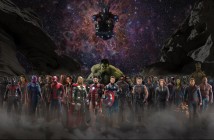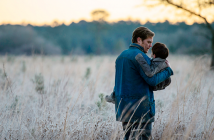
Editor’s Notes: The following review is part of our coverage of the Munich International Film Festival. For more information visit filmfest-muenchen.de/en and follow the Filmfest München on Twitter at @filmfestmunich.
Actor-turned-director Andrea di Stefano presented his film Escobar: Paradise Lost in Munich where it had its German premiere the same time the film was theatrically released in the US after playing the festival circuit back in 2014. It tells the story of Colombian drug lord Pablo Escobar from the perspective of an outsider, who suddenly finds himself caught up in the violent and brutal drug cartel run by Escobar.
When Nick (Josh Hutcherson) moves to Colombia with his brother and sister-in-law to open a surf camp on the coast he quickly falls in love with Maria (Claudia Traisac), who turns out to be the niece of Pablo Escobar (Benicio del Toro). Nick slowly becomes part of the Escobar family and is at the same time fascinated and irritated by the ambiguous personality of Pablo. When he comes to terms with the extent of Pablo’s power and his involvement in the ruthless drug business, Nick has to play his part and seems unable to escape the favor he has to do for Pablo as soon as he is about to turn himself in to the police.
I sat down with Andrea di Stefano in Munich to talk about his debut film, the character of Pablo Escobar and his experiences as a first-time director by starting with the standard question of how he got involved with this project in the first place.
Corina Röttger: What got you interested in the story of Pablo Escobar?

Andrea di Stefano: The story of this man is inspired by a true story and I immediately saw a Greek tragedy within this story so I decided to pursue it.
Corina Röttger: Although his name is in the title and the main plot is structured around Escobar, he is almost like a supporting character in your film. Why did you choose to tell the story from Nick’s perspective?
Andrea di Stefano: I didn’t really choose to do that. I just learned about the story of this man and I thought the story was a metaphor of how the whole country of Colombia was first fascinated by this man and then faced certain aspects of him. Especially on a cinematographically point of view I wanted to make a movie that could give the audience the feeling of what it means to face that tsunami of evil. So I started from there.
Corina Röttger: Pablo Escobar is portrayed as a loving and dedicated family man, despite being a ruthless drug lord. Can you elaborate on the importance of family in the film, since it is one of the major themes?
Andrea di Stefano: Well, I think the good thing about a movie like The Godfather for example is that it is a movie about what? Mafia? What makes those characters interesting is that they have families. They go back home and they talk, it is about friendship, family and at the same time these characters are able to order a hit and kill somebody. I think, when I started Escobar, what hit me was his relationship with his family. He was considered by his children and his brother as the best of fathers. He was so loving to his kids. It was interesting because it was almost two sides of a coin, two complete opposites; a family father and a psychotic character.
Corina Röttger: How did you get Benicio del Toro and Josh Hutcherson on board as a first-time director? Were you already connected before this project?
Andrea di Stefano: No. I met Josh while he was shooting the first Hunger Games movie. I went to the set in Atlanta because I saw him in The Kids Are Alright. I spoke to his agent, I got a meeting and went to the set to meet him. With Benicio I went through the conventional process of sending the script to his agent who liked it and gave it to him and it all went from there.
Corina Röttger: I read that both of them served as executive producers as well besides playing the lead roles. It seems like you worked very well together.
Andrea di Stefano: Yes, their support of the film was so encouraging to me that they became executive producers besides starring in the film; it was just the right thing to do.
Corina Röttger: Since Escobar: Paradise Lost is your debut as a writer and director, how much of your acting experience did play a part in making this film? Did you have any advantages as an actor or challenges that you came across?
Andrea di Stefano: No, they are all advantages of course. I knew how a movie set works and all the little tricks but there is a certain sensibility when you speak to actors that somehow I have instinctively. When you are an actor, you build up a lot of frustration sometimes working with directors so I knew which director I wanted to be in relationship with actors.
Corina Röttger: Now that you have worked as a director, how did being on set and standing behind the camera feel compared to working as an actor for your previous projects?
Andrea di Stefano: It felt, to tell the truth, very organic. I didn’t feel like “oh my god, what am I doing?”. I always felt in control so I felt comfortable. A lot of pressure of course but I always felt like I knew what I was doing.
Corina Röttger: Do you have anything planned for the future already?
Andrea di Stefano: I’m developing three stories. I don’t know yet which one I’m going to pursue actively.
Corina Röttger: And you are planning on writing these scripts and directing the films yourself again?
Andrea di Stefano: Yes.
Corina Röttger: What about acting?
Andrea di Stefano: I’m not really thinking about acting right now. With directing you are more in control. It satisfies my control freak attitude, you know. If I make a mistake it is me. You are always a storyteller but you are more an author of what you do when you direct a movie than when you act.



